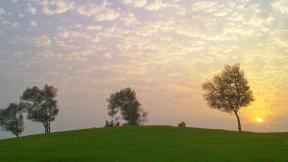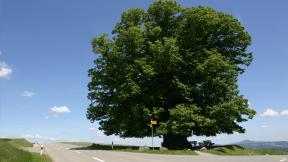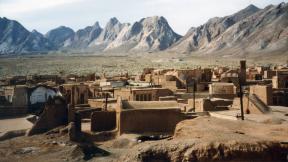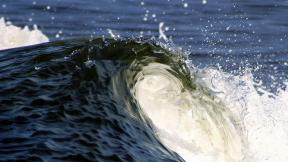
Please note: The following interview was conducted in 2010, shortly after Abdul-Matin’s book was published
Interview conducted by Meha Ahmad
1. Please explain the phrase "Green Deen" and how it's used in your book.
"Green" has come to be a catchall phrase for all things environmental and sustainable. “Deen” is the Arabic word for religion, way of life, or path. So "Green Deen" literally means environmental path, green way, or any other combination of the definitions.
The book "Green Deen" illustrates how the power of religion can be used to involve people of faith in the environmental movement. The book examines Islamic principles and how they can be applied to water, waste, energy, and food - the four things that any society needs to manage for survival. I also share my story as a Black Muslim environmentalist and share stories of Muslim Americans across the country. All of us are inspired by Islam to live an earth-conscious life.
2. What first sparked your interest in environmental issues?
I grew up in Brooklyn, New York. I thought for the first 5 years of my life that the entire world was a sea of concrete buildings. Until one day, my father took me hiking on Bear Mountain, just a short, one-hour drive from New York City. The beauty of nature completely stunned me. You'll read more in the book's introduction about this day when I discovered trees, dirt, and moss growing on rocks, but essentially, I remember seeing my father pray on the mountain. He told me, "The Earth is a mosque. You can pray everywhere. Everywhere is sacred." From that moment on, I felt a deep sense of responsibility to protect the planet. Allah created this space for us to worship Him. Destroying it not only prevents us from properly worshipping (Him), but it is disrespectful to His creation.
3. I understand you grew up in the city. How did this influence your perspective on green issues?
Well, as I mentioned, when I was young, I thought that the entire world was a sea of concrete buildings. As an adult however, I've learned that living in the city is quite conducive to an environmentally-conscious lifestyle. For example, I am a pedestrian, a biker, and an avid user of public transportation. I do not own a car. There are hundreds of places to shop that offer locally grown, organic foods. Not everything is a Costco or Wal-Mart. The city, specifically New York City, is committed to reducing its carbon footprint. As a policy advisor in the Mayor's Office of Long-Term Planning and Sustainability, I have spent the last year studying how innovative policies can improve our air quality, water infrastructure, how we manage waste, energy, and deal with the negative effects of climate change.
4. Did your parents raise you to be environmentally conscious?
Absolutely. My father is very connected to the natural world. He has been his entire life. He grew up on a farm in southern Virginia. Till this day, he removes himself from the material world and takes week-long trips into the woods, the mountains, and the wilderness to pray. He says praying in nature is the ultimate form of worship. For my mother, being environmentally conscious was more about making smart choices. We didn't have a lot of money growing up. So when it came time to feed us kids, my mom could either opt for the more expensive packaged and processed foods or she could pack up raw broccoli, tuna with lemon, and 10-cent tofu blocks from the Chinese grocer. She also didn't waste things. See, "going green," is not about buying new things that are eco-friendly. It's about wisely reusing what you already have. Today my mother says, "Being green is being considerate to future generations."
5. What inspired you to write "Green Deen"?
In 2008, I went to a conference called "The Dream Reborn," in Memphis, Tennessee. This conference was a gathering of environmental justice activists. It was a beautiful group of very dedicated and inspiring people. But I was curious - what was the ordinary resident of Memphis thinking? So I ventured into the downtown area away from the conference, and met an old woman at a diner. I asked her, "What do you think of climate change?" She said, "I think it's something Democrats want me to be afraid of. Just like Republicans want me to be afraid of terrorists."
In that moment I knew that unless environmentalists found a deeper, Divine, more spiritual reason for folks to become involved in the movement, they would simply see it as propaganda. Since I'm Muslim, I decided to look to my own Deen of Islam to learn more about its connection to the planet and then tell Muslims all about it!
6. What are the main teachings in Islam about protecting the planet?
I need to give a serious shout out to my dear brother Faraz Khan in New Jersey. Faraz is a true scholar and far more capable of writing a book than I am. Faraz has been studying what Islamic scholars say about the environment for some time. It's his work that leads to the six principles of a Green Deen in Islam that I cite in the book:
- Tawhid (oneness)
- Ayats (signs of God)
- Khalifah (being a steward of the Earth)
- Amana (our sacred trust with God)
- Adl (justice)
- Mizan (maintaining the natural world's delicate balance)
Very quickly, the concept of Tawhid allows us to see everything as connected - we are all from Allah and to Him we shall return.
Ayats are not only the verses of the Quran but every miracle that God has created: snowflakes, raindrops, palm trees, mountaintops.
Allah repeats in the Quran, "There are signs for those who reflect," and I believe a Green Deen requires this reflection. We are Khalifahs, vicegerents of Allah on Earth. He has entrusted us to take care of His creation and to leave it better than we found it.
Think of it this way: the Prophet Muhammad (peace be upon him) left US better than he found us. The least we can do is leave the Earth better than we found it.
Finally, Allah has created everything in a perfect balance, we have everything we need on this Earth to live and thrive. We are part of this delicate balance. To destroy this balance is to do injustice. To maintain this balance is to do justice.
The example that resonates with me most is of mountaintop coal removal. FIfty percent of our electricity comes from coal. In order to remove coal, we destroy entire mountains, ecosystems, and societies. We remove valuable resources from the Earth - but put toxins back into it. How is this maintaining the delicate balance? How is this moving towards justice?
7. Your book addresses how protecting the planet is the duty of the Muslim. How would you advise Muslims to start implementing that duty today?
Muslims need to start looking back 50 percent of the time and looking forward 50 percent of the time. What I mean is that our Prophet (peace be upon him) and his Sahaba (Companions) led a very green existence. They knew how to live off the land, they ate little meat, which they sacrificed themselves, and never depended on a factory farming system. They lived minimally, not defining themselves based on their material possessions, but rather on their closeness to Allah.
By looking forward I mean by becoming involved in environmental innovation. Finding the new, clean energy technology that will be usable by the entire world. Choosing to use "Energy from Heaven'' such as sun and wind over "Energy from Hell" such as oil and coal. This would mean demanding that our elected officials begin focusing on harnessing the power of the sun and the wind and not allowing coal mining companies to ruin entire communities and ecosystems just to get the coal that powers our homes.
And pray. Green Muslims need to pray. Our five times a day are in sync with the rhythm of the Earth. The more we pray, the more in tune we are with the planet. And as my father does, pray outside.
8. There are many environmental issues facing us today. What do you think is the most pressing, and what would you urge Muslims (and others) to do to fight it?
Muslims need to become advocates for worldwide clean water. No one uses more water than Muslims. We do Wudu five times a day. We break our fast with water. Our Holy City of Mecca exists because of the well of Zamzam.
Nearly one billion people on Earth do not have access to clean water! Every 20 seconds a child dies from a water-related disease. Bottled water companies are on a mission to privatize water - tragedy if this happens! Even more people would be left without drinking water if a cost becomes attached to it. From now on, whenever someone asks you, a Muslim, why you follow Islam or asks you about terrorism, start talking about water. Join clean water campaigns. Pressure the UN, the WHO, and other international organizations to make this a REAL priority.
9. You cite in your book many individuals, organizations and Masjids who are making strides in living more "green deen" ways of life, mash Allah. Which really leads the pack and stands out to you?
Perhaps what is most inspiring are the organizations that I did not know about when I wrote “Green Deen”. See, the real purpose behind the book was to connect an already growing movement. Recently, I was in Milwaukee, Wisconsin and met some of the organizers of MA'RUF, who organize neighborhood clean-ups and distribute whole food to hungry peoples - now that is the spirit, Green Deen superstars are all over the USA!
Out of the people I specifically mentioned in “Green Deen”, I am most inspired by the efforts of Congressman Keith Ellison, who has been an environmental leader long before we knew him as a political leader. Also, Yasir Syeed, who along with his wife (their outstanding extended family includes Sayyid Syeed and the filmmaker Musa Syeed), are the backbone of GreenZabiha.com.
I spoke earlier about Faraz Khan, he, along with Mohammed Chakaki, Nadia Janjua, Sanjana Ahmed, Nazaahah Amin, and Sarah Jawaid are real Muslim eco-superstars.
Of course, there is a towering figure, the generous Adnan Durrani of Saffron Road, who has mentored and helped to shape a whole generation, like Abdullah Nana of Halal Advocates and Shahed Amanullah of Zabiha.com, which will transform the way we process Halal food in the USA. Insha Allah it will be grass-fed, humanely raised, fairly traded, and taste much, much better!
Internationally, the efforts of Nana Firman, who is working with the Indonesian government and specifically in Jakarta to develop plans for what happens when the effects of climate change become terribly dramatic and drastic. That sort of planning is called “Climate Adaptation” or “Climate Resilience” and she is an incredibly important connecter, internationally, for how Muslim nations and states and countries with Muslim populations respond to climate changes and disruptions.
10. The GOP announced that one of their top priorities for 2011 will be to target "excessive environmental" regulation. What are your thoughts on this? What problems do you think we'll be facing from deniers of climate change in 2011?
Muslim Americans need to create a whole movement, in America, to stop these anti-regulationists.
I wrote an article once and received the following comment that sums up the argument of those politicos that claim excessive environmental regulation as their priority:
"God created the whole universe(s), not just the insignificant dust speck we have inhabited to date and which exists solely for our benefit. We were created to use it up and move on."
One fundamental flaw in the entire economic system we are currently in is in its intentions. When we eat a fruit we intend for it to nourish us so that we can go about the business of our day. Now, if the primary focus of our day is to praise Allah, then we are eating that fruit with the intention of praising Allah. Then the way that you would harvest and care for that fruit would reflect that. You might be compelled to give a hefty portion away, you might also be compelled to pray as much in the land where the fruit was raised and be very careful about the water it was fed and what was allowed to go into the ground around those fruit trees. Well, if your focus is, instead, to "use it up (resources) and move on" then you would care very little for the ground around the fruit, the water they were fed. Your focus would solely be on profit. Your focus would be blinded by greed and profits. This sort of focus is akin to prescribing partners to the worship of Allah and it is a dangerous course of action.
These anti-regulation activists want to perpetuate a system of putting profits ahead of people. Evidence of this is when, just after the (2006) midterm election, Karl Rove was at a polluters conference and spoke about his anti-regulation agenda. Across the nation, polluters are pushing plans to pump chemicals into bedrock near water supplies to get at pockets of natural gas trapped inside. This dangerous process, known as hydrofracking, can ruin water supplies particularly if there is no regulation.
Now people live in the United States because it is an organized society that takes care of basic infrastructure needs. If our government cannot protect our water supply from private companies who want no oversight so they, filled with greed, can destroy our water supply - then what is the role of government?
It would be disheartening if Muslims in the United States do not make this their issue because who uses water more than us?
Ibrahim Abdul-Matin is an environmental activist and author of Green Deen: What Islam Teaches about Protecting the Planet (2010)








Comments
What a great, eloquent & mammoth literary research work done. In fact my glancing @ d interview & ur responses convinced me the greatness of ur titled book "Green Deen" but d most unfortunate 4 me is dat i can't get ur products. Am in 9ja i don't hv any credit card. Thump up
Location
Add new comment